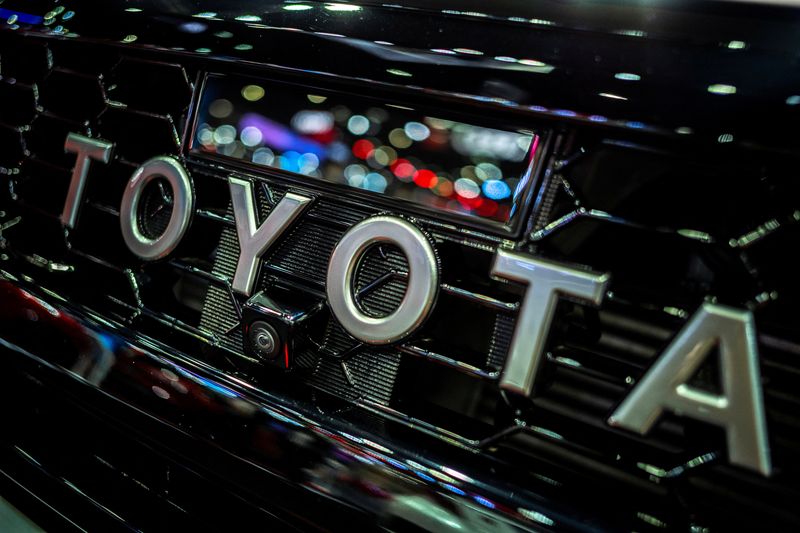TOKYO/SINGAPORE (Reuters) - Toyota Motor (NYSE:TM) has said it is moving toward production of solid-state batteries for the next generation of electric vehicles (EVs), bringing a technology that promises more energy storage and faster charging closer to market.
HOW ARE SOLID-STATE BATTERIES DIFFERENT?
Solid-state batteries use thin layers of solid electrolytes that carry lithium ions between electrodes.
The lithium-ion (li-ion) batteries widely in use, by contrast, use liquid electrolytes.
Solid-state batteries have been used in small electronic devices such as pacemakers and smart watches. Mass-market production of the batteries for EVs has been slower to develop.
Toyota said it has overcome an issue with the durability of solid-state batteries that would pave the way for production, which it expects to begin in 2027-2028.
WHAT ARE THE ADVANTAGES OF SOLID-STATE BATTERIES?
They have been called "the grail" of battery development and "the kiss of death" for combustion-engine offerings because of their power and the driving range possible on a single charge.
Solid-state batteries can hold more energy than liquid lithium-ion batteries, a gain that would potentially speed the transition to EVs by addressing a consumer concern: range.
A Reuters poll in March found 35% of Americans surveyed wanted EVs with ranges of 500 miles or more (804 km or more), a distance few currently offer.
Solid-state batteries have also been promoted as a way to reduce charging time.
Toyota said it expects its solid-state battery would have a charging time of 10 minutes or less. By comparison, the Tesla (NASDAQ:TSLA) Supercharger network, the largest of its kind, offers the equivalent of 321 km of charge in 15 minutes.
There is also safety. The electrolyte in liquid lithium-ion batteries is volatile and flammable at high temperatures, meaning there is a risk of fire or chemical leaks.
WHY IS IT DIFFICULT TO MANUFACTURE SOLID STATE BATTERIES?
Automakers and technology companies have produced solid-state battery cells for EVs in prototype, but have been unable so far to scale to mass production.
It is hard to design a solid electrolyte that is stable and chemically inert and yet is still a good conductor of ions between the electrodes. They are also expensive to fabricate and prone to cracking.
That has made solid-state batteries far more expensive than liquid lithium-ion batteries.
Toyota did not disclose cost estimates for its new solid-state battery EV or the additional investment it would have to make to ramp up production.
WHO'S TRYING TO MAKE THEM?
Most major automakers - with the exception of Tesla - have disclosed development efforts or partnerships.
Toyota has been pushing solid-state battery development and has teamed with Panasonic (OTC:PCRFY) on related projects.
Nissan (OTC:NSANY) Motor, the first automaker to launch a mass-market EV with the Leaf, has said it is developing solid-state batteries and is working toward mass production by 2028.
Honda is developing solid-state batteries but has not detailed a timeline for bringing them to market.
U.S. battery start-up QuantumScape, backed by Bill Gates and Volkswagen (ETR:VOWG_p), has said it has contracts with six electric vehicle makers, including Volkswagen.
Automotive Cells Co, a venture between Mercedes-Benz, Stellantis and TotalEnergies, has an agreement to develop solid-state batteries with Taiwan-based battery maker ProLogium Technology.

Ford and BMW have invested in U.S.-based startup Solid Power, which is producing prototype batteries. Hyundai Motor, another Solid Power investor, has said it plans to mass produce solid-state batteries by 2030.
Tesla has not detailed solid-state battery development plans. The EV market leader has been focused on the rollout of more powerful 4680 cells for its Cybertruck and other vehicles.